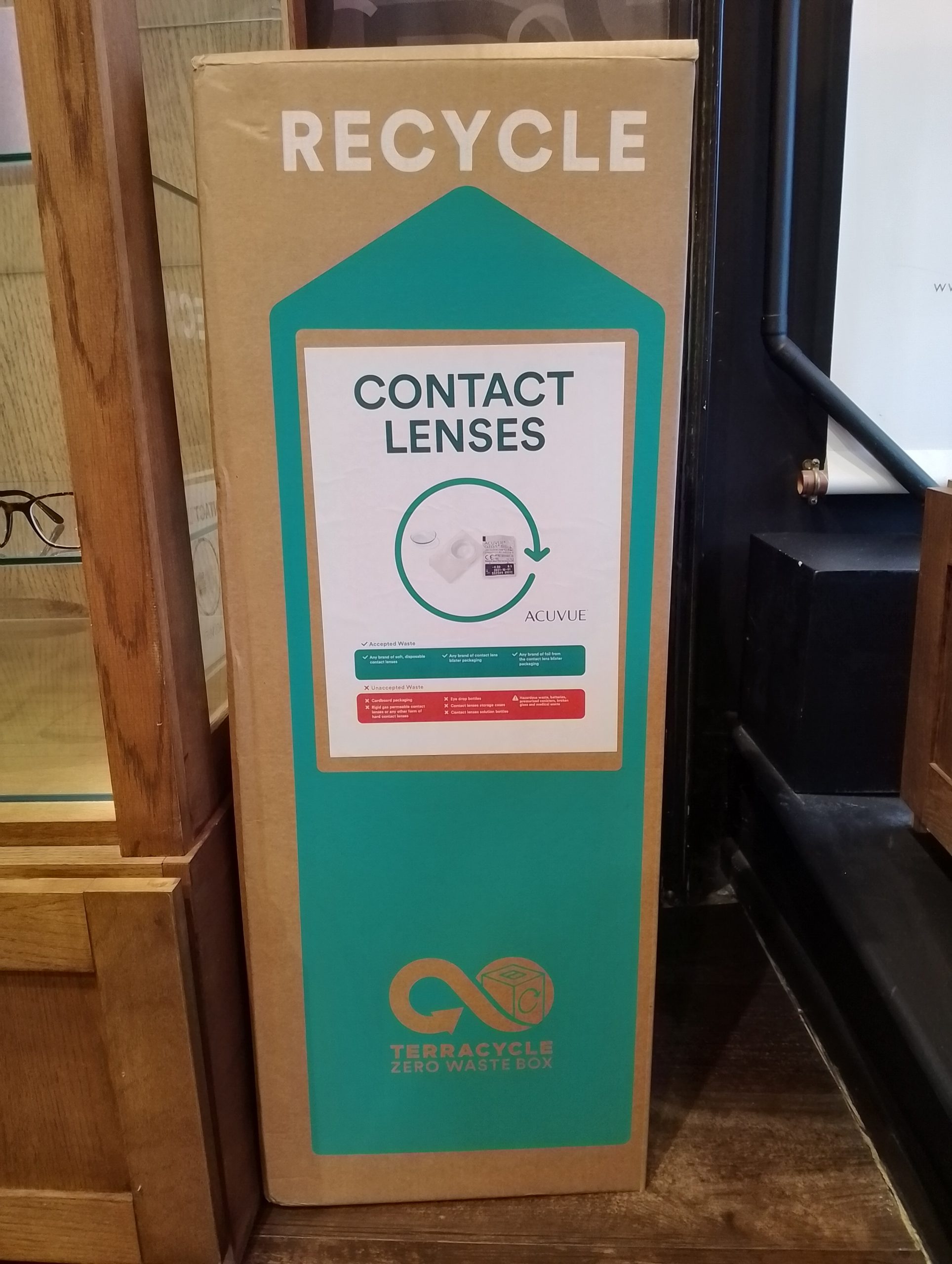
Contact Lenses
Choosing what’s best for you
Are contact lenses good for me?
Contact lenses are useful if you’re unable to (or would prefer not to) wear glasses all the time, for example if your work or hobbies mean that glasses do not work for you.
There are a wide range of daily disposable lens options available, all of which you wear once and throw away.
Daily Disposable lenses are suitable for most prescriptions, including those with astigmatism or those requiring different prescriptions for distance and near, though some higher prescriptions cannot be found in a daily lens. These prescriptions may require monthly lenses, or Rigid Gas Permeable lenses.
By wearing daily lenses, you’ll save money on solutions as well as the time and effort of having to clean your lenses. They are also sterile every time you open the packet and put them in the eye, reducing the risk of infection (though there is always a slight risk of infection with contact lenses which can be mitigated with good hygiene).
What is a day lens?
A day lens is a contact lens worn only during daytime.
You remove them before sleep. Monthlies can be cleaned and reworn for up to 30 days. Two Weekly lenses can be cleaned and reworn for up to 14 days. Dailies are only used once and then discarded.
What are multifocal contact lenses?
Multifocal contact lenses incorporate multiple prescriptions in one lens. You can think of them as varifocal contact lenses, though they focus the light slightly differently to varifocal spectacles.
Multifocal contact lenses focus things which are far away from you, things at an intermediate distance, and things close to you. This means that people who need reading glasses can wear, or continue to wear, contact lenses. However, there is always a compromise on the clarity of multifocal contact lenses – they are not as sharp as contact lenses which just focus the distance. Most people find the vision to be good enough for everyday tasks.
We’ll help you explore multifocal contact lenses and how to think about whether they’re right for you.
What are the advantages of multifocal lenses?
- Better visual acuity for the range of distances from near to far
- A less abrupt switch between prescriptions
- The ability to see in most conditions without extra eyewear.
FAQ’s
Why should I use multifocal lenses?
Contact lenses are useful if you’re unable to wear specs all the time, whether for work or sport, or if you would like the option not to have to wear specs.
Do I have to look down to read as with my varifocal glasses?
No. The contact lenses are designed so that you can read without looking down.
Will my vision be as good as it is wearing my varifocal lenses?
No. There is a compromise. We aim to replicate varifocal glasses as much as possible, but the focus will be softer. This is because there is always more than one prescription in front of your eyes.
If I like them, can I wear them every day?
Yes. Just give your eyes a few hours off in the evening. We do recommend at least one day off wearing the lenses per week if possible.
What do I have to do to start wearing multifocal lenses?
People can begin wearing multifocal lenses once they need a reading prescription to help with close work. If you would like to try them, get in touch and we can arrange an appointment to get things started.
Night and Day lenses are contact lenses which have been licensed for use 24 hours per day for up to six days at a time. This means that they can be left in the eyes overnight as you sleep, making them perfect for people with extremely active lifestyles, or military and emergency services personnel.
The risk of infection is increased when wearing the lenses full-time. It is important that you are careful with the hygiene of the lenses, and contact your optician immediately if you feel any changes occur with your eyes. The lenses must be removed every six days, cleaned, and stored overnight in solution. You must also attend regular sight tests so that the health of the eyes can be checked.
If you would like to try Night & Day lenses, please contact us to arrange an appointment.
“During the COVID-19 pandemic, I have been receiving more referrals for painful red eyes.
Some of these have been infective keratitis in extended wear contact lens wearers. These patients appeared to be unaware of the greater risk of keratitis in extended wear. All extended wear contact lens wearers MUST know the risks and take steps to minimise them”.
Marc Drake
A Night Lens, also referred to as Ortho K, gives you freedom from glasses, daytime contact lenses and laser eye surgery. Night lenses are contact lenses that and harmlessly correct your vision whilst sleeping. It is completely reversible – if you stop wearing the lenses, your vision will return to normal.
You simply pop them in at bedtime, go to sleep, and take them out when you wake up.
You must wear the lenses every night to maintain the vision. It is only suitable for people with a prescription of -5.00D or less.
Why night lenses are a great option:
- No need for glasses or daytime lenses
- Good for the environment
- Great for sports; including water sports and fitness training
- Convenient, especially at work
- Good for dry eye sufferers
- Great for holidays
- Improves confidence
- Studies show it is successful at managing myopia in teenagers and younger children.
For children, night lenses can prevent short sightedness from getting worse and help decrease the risks of, or even prevent, future eye disease linked to myopia.
Click here for more on Myopia control
Large-diameter gas permeable (GP) lenses, like conventional GP lenses, have many strengths when compared to soft lenses. These include:
- Sharper vision
- Greater durability
- Easier handling
- Reduced risk of complications
Normal GP lenses sit on the clear part on the front of the eye, also known as the cornea. Large Diameter Rigid Gas Permeable Lenses, also known as scleral lenses, vault over the entire corneal surface and rest on the “white” of the eye (the sclera).
Because of their size, scleral lenses are more stable on the eye and less likely to accidentally dislodge. This stability also offers additional comfort similar to soft lenses, especially for sensitive eyes or irregularly shaped corneas.
Types of Scleral Lenses
There are three categories of scleral lenses:
- Corneo-scleral lenses and semi-scleral lenses are much larger than conventional GP lenses and rest near the junction between the cornea and the sclera
- Mini-scleral lenses vault over the entire corneal surface and rest on the sclera
- Full scleral lenses are the largest scleral lenses and provide the greatest amount of clearance between the back surface of the lens and the cornea.
All modern scleral lenses are made with highly breathable, rigid gas permeable lens materials.
Even though they cover the entire cornea, plenty of oxygen reaches the surface of the eye to keep it healthy and comfortable.
Are you a good candidate?
Anyone interested in achieving the best vision possible with contact lenses should consider scleral lenses. However, they’re particularly helpful for the following conditions:
- Irregular corneas. Vision problems caused by an irregularly shaped cornea — whether naturally occurring, due to an eye condition such as keratoconus, or resulting from eye surgery — typically cannot be fully corrected with glasses or soft contact lenses. Scleral lenses typically will provide sharper vision for these eyes.
- Hard-to-fit eyes. If your eyes cannot be comfortably fitted with conventional GP lenses or the shape of your eye causes the lenses to dislodge too easily from your eyes (during sports, for example), scleral lenses can provide a more comfortable and secure fit.
- Dry eyes. If your eyes are too dry for conventional contact lenses, scleral lenses can help. In particular, the generous space between the back surface of full scleral lenses and the cornea acts as a tear reservoir to keep the front of your eye moist and comfortable.
Cost of Scleral Lenses
Scleral lenses are custom-made to the exact specifications prescribed by your optometrist to provide the best possible vision, eye health and comfort. Special automated measuring tools and imaging devices are often used to fit them. This makes them more expensive than other types of contact lenses. We can advise you of specific costs for your individual needs.
If you have struggled to find contact lenses that are right for you, for example because of an eye condition or due to a high prescription, Specialist Contact Lenses could be able to provide you with clear, comfortable vision without spectacles.
At an appointment, your optometrist will carefully map your cornea, recommend the right lens for you, fit these bespoke lenses to your eyes, and provide advice on how to care for your lenses. Types of Speciality contact lens fittings we offer include:
- Myopia Management
- Night Lenses (Ortho K Lenses)
- Day Lenses (MiSight Lenses)
- Keratoconus Lenses
- Gas Permeable Lenses
- Corneoscleral Lenses
- Mini Scleral Lenses.
Contact lenses are useful if you’re unable to wear glasses all the time, for work or sport for example, or if would would like to have the option not to have to wear your glasses all the time.
Here at Osmond Drake, we help you choose the right type of lenses, teach you how to use them, and provide ongoing aftercare. Contact us if you would like to explore the option of Specialist Contact Lenses
Some patients will not require an Enhanced Eye Examination. If you’re under 40 and have no known eye conditions and no health concerns, our Standard Eye Examination will be adequate.
What happens in a sight test?
The sight test is made up of several parts which come together to ensure we perform a thorough check of your eyes. Don’t worry – your optometrist will guide you through every part of the sight test.
- First, your optician will ask you some questions about any problems you’ve been having with your vision or your eyes; including blurriness, discomfort, discharge and so on. They will also ask about any problems you’ve had with your eyes previously, your general health, medications, whether you drive, and your occupation. This lets us tailor the eye examination to your individual needs, making sure we provide you with the best check possible.
- Next, they will check your vision by asking you to read off the chart. They will show you some different lenses to work out the best spectacle prescription for you.
- Then, your optometrist will use a microscope to examine your eyes and check for any ocular health issues.
- Finally, the optometrist will explain their findings and make some recommendations on how you can make the most of your vision and keep your eyes healthy. This may include getting new glasses, contact lenses, suggesting lifestyle changes that will help you keep your eyes healthy, safety glasses, sports goggles, or alternative options to keep your eyes at their best.
There are some other tests your optometrist may perform to help them check your eye health. These may include:
- Eye pressure check. Don’t worry – we don’t do the air puff test any more! This test is painless and quick, and lets us check the pressure in the eye is healthy.
- Visual fields test. This lets your optometrist make sure that your peripheral vision is as it should be.
- Colour vision test. These checks allow your optometrist to tell if you see colours in the same way as most of the population. This is important for certain jobs, eg. train drivers and electricians.
- Topography. This is when your optometrist measures the curvature of the surface of your eye.
If you have any questions about any of the tests, please ask one of our friendly staff members.
This can be covered by the NHS (if eligible) or privately at a cost of £35.
How Do I Insert Soft Contact Lenses?
Please see our helpful how-to video on inserting soft lenses.
How Do I Take Out Soft Contact Lenses?
Please watch our how-to video on removing soft lenses
How Do I Insert Rigid Lenses?
Watch our useful how-to video to find out more!
How Do I Remove Rigid Lenses?
Our helpful video guide will show you how!

We are dedicated to becoming a greener practice.
We have a recycling box for contact lenses and their blister packs as these cannot go in normal home recycling.
Drop in at any time to recycle your lenses and packaging!
Here at Osmond Drake Opticians we work with you to get the right Contact Lenses for you. We take time to teach you how to use them safely and hygienicallyand are always on hand to answer any questions you may have.
For more information please call us today on (029) 20709526.
“We would like to thank you most sincerely for the fantastic professional care and attention you give to our eyes. It’s beyond the call of duty. It cannot be bettered anywhere in the world—and we travelled a great deal of it during our working years. The Drake team is UNBEATABLE!”
M&J Peirson
“Brilliant staff, excellent with children.
Always go out of their way to help.”
K. Porter


We are committed to providing the best care possible which is why all of our staff are trained
to understand the needs of people with Dementia or Autism.
If you or a member of your family has been diagnosed with dementia or autism then please
be sure to let our staff know when booking an appointment



